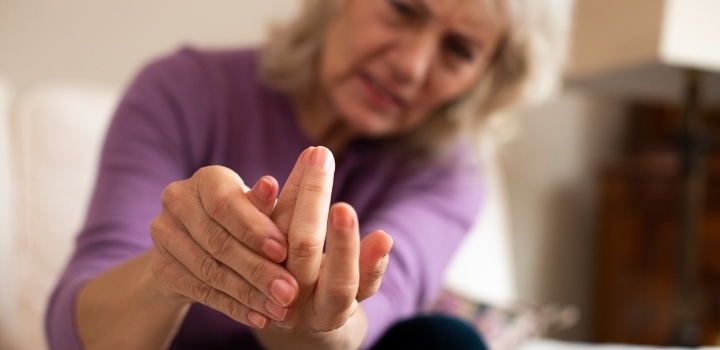How COVID-19 lockdown has impacted people with arthritis
By: News Archive

People with arthritis experienced a ‘roller coaster’ of emotions and saw their symptoms worsen during the COVID-19 lockdown – according to research from the University of East Anglia.
A 12-week survey of 264 people with inflammatory arthritis (such as rheumatoid arthritis) found that 39 per cent of patients reported worsening symptoms, and 42 percent experienced lower energy levels.
The majority also spoke of emotional fluctuations - from feeling positive to being isolated, depressed and anxious.
The research team have set out a series of recommendations so that health professionals can better support those at risk of poor health and wellbeing during the COVID-19 pandemic. They hope their work will help people cope better with pain, worry and symptoms during this time.
Lead researcher Prof Alex MacGregor, from UEA’s Norwich Medical School, said: “We know that social isolation and loneliness can lead to poor health outcomes for people with conditions like arthritis.
“Medications for inflammatory arthritis can increase clinical vulnerability to COVID-19, and many patients were advised to shield or stringently social distance.
“We wanted to understand how social distancing measures such as lockdown and shielding impact people with inflammatory arthritis, including their wellbeing and access to healthcare support.”
The research team investigated the impact of lockdown for people on the Norfolk Arthritis Register (NOAR), a large population-based cohort of patients identified as having inflammatory arthritis.
They were asked to take part in a 12-week online survey to see how they are coping at this difficult time of coronavirus self-isolation. Of 264 that took part, 26 also took part in follow-up telephone interviews with questions covering exercise, pain, fatigue, wellbeing, employment, managing daily activities, social support and access to healthcare.
The study is ongoing, with fortnightly surveys set to take place until July 30 as well as a follow up interview as COVID-19 restrictions start to ease.
Prof MacGregor said: “The majority of patients had reduced levels of physical activity - largely because they were not getting out of the house to exercise.
“The most worrying thing that we found is that a lot of patients reported worsening symptoms, along with lower energy levels. Symptoms such as pain flare ups and stiffness were in many cases put down to reduced activity and exercise.
“But many did not seek help because they didn’t want to over-burden the NHS while they were dealing with the pandemic, or they were too worried about picking up the virus in healthcare settings.
“Some missed blood tests, some didn’t know if hospital helplines were still in place, and not everyone was aware they could get medication delivered while they were shielding.
“Many found that telephone health appointments were no substitute for face-to-face contact and felt less able to discuss symptoms or emotional issues on the phone.
“When it comes to mental health, a few enjoyed the time at home and found that it helped their symptom management. However the majority spoke of emotional fluctuations, between feeling positive to being isolated, depressed and anxious.
“Many felt vulnerable and anxious, with a sense of being left behind or forgotten about as restrictions eased and life resumed for other people.
“And they were worried about the future because they were not sure if they would ever get out. Some said they would continue staying at home even if shielding guidelines were relaxed, and a few said only a vaccine would make them safe.
“Shielding advice was interpreted in different ways. Many weighed up the risk of infection against their physical and mental wellbeing, for example weighing up whether or not to take walks or just stay at home.
“We also found that some patients were working at home in ways which were not optimal for joint health – such as using laptops on dining tables. Only a few gained support from employers to set up ergonomic work spaces at home. Others struggled with additional demands such as childcare, or had less help with household tasks whilst shielding.”
Recommendations for clinicians and healthcare workers include being more clear with advice, and offering additional support to help patients interpret shielding guidance. The report also recommends allowing patients more choice, with telephone consultations as an option, rather than the norm.
‘The impact of COVID-19 self-isolation measures on people with inflammatory arthritis: Interim briefing report for health professionals’ is published on July 10, 2020.
Related Articles

Plans submitted for a new high-tech anatomy centre at UEA
Plans have been submitted by the University of East Anglia for a new future-proofed anatomy suite to be built as an extension to the Edith Cavell Building on Norwich Research Park, following extensive feasibility studies and a successful grant application
Read more
UEA teams up with Age UK Norwich to tackle dangerous dehydration in older people
Experts from the University of East Anglia (UEA) and Age UK Norwich have teamed up to tackle dehydration in later life, producing new resources aimed at older people and professionals.
Read more
Nurses worldwide rely on intuition to triage patients
Nurses around the world use intuition to work out how sick a patient is before triaging for treatment according to new research from the University of East Anglia.
Read more